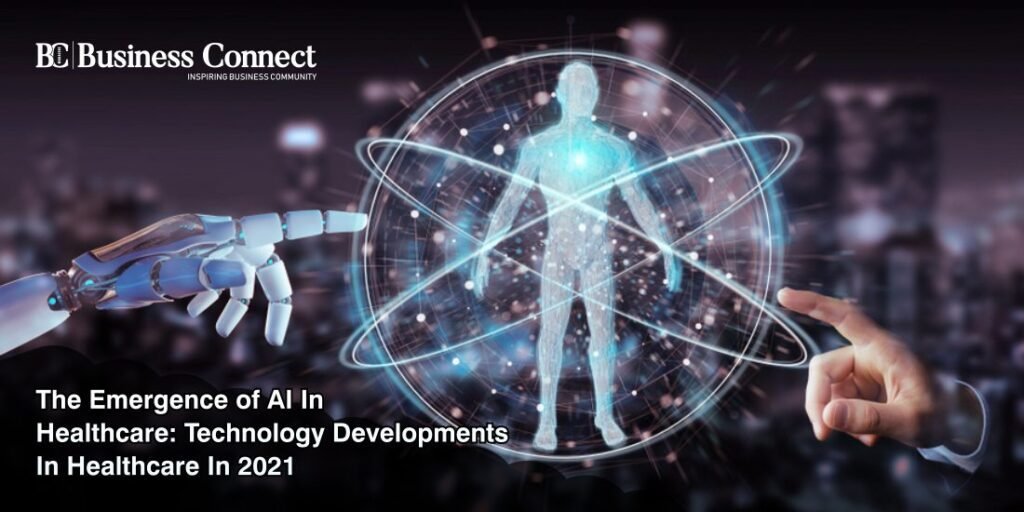THE EMERGENCE OF AI IN HEALTHCARE: TECHNOLOGY DEVELOPMENTS IN HEALTHCARE IN 2021
Today, the coronavirus pandemic has stunned the world, not only emotionally but also financially. With the lack of healthcare facilities, the deadly virus and its variants are spreading like a forest fire. Ventilators, PPE kits, Oxygen cylinders, beds, and other essential equipment are in short supply in hospitals during 2nd wave of COVID-19 (SARS-COV-2). Thanks to technological advancements in healthcare by which we got the COVID-19 vaccine and people are getting online appointments, prescriptions, medications, and dietary supplements at their homes, all while maintaining hygiene and protection during the lockdown.
The domain of healthcare nowadays is adopting technical advances at a breakneck pace. Artificial intelligence (AI), Telemedicine, Cloud computing, Virtual Reality (VR) and Augmented Reality (AR), Big data and predictive analysis, and the Internet of Medical things (IoMT) are few emerging healthcare technology trends in 2021.
According to recent reports, In India’s healthcare system, artificial intelligence (AI) and machine learning (ML) are becoming more widely used. Today, Indian startups are using these innovations to develop locally specific and novel digital solutions that resolve healthcare issues.
With India having 5,154 HealthTech startups as per Tracxn data (April 2021), it is one of the most rapidly expanding industries. Increased wages, improved health literacy, lifestyle diseases, and increased access to insurance are projected to propel India’s healthcare market to US$ 372 billion by 2022.
Patients, healthcare software creators, and healthcare professionals are all benefiting greatly from the introduction of these technologies in healthcare.
Healthcare IT is a revolutionary concept that has the potential to move healthcare forward, increase connectivity, improve patient experience through patient engagement solutions, and minimize the overall cost of healthcare delivery in the coming years by making it more effective and data-driven.
Healthcare and Startups
Healthcare’s unaffordability and accessibility are two factors that have fuelled the growth of the healthcare startup community in India and have encouraged entrepreneurs to innovate.
Furthermore, these startups not only assist patients in obtaining high-quality healthcare, but they also build employment. By 2030, the sector would have created 40 million jobs.
What is Artificial Intelligence (AI)?
AI is known as the application of science and engineering to the development of intelligent computer systems capable of performing tasks without direct human input.
Machines and computer programs, like the human brain, can solve problems and understand.
AI technologies used in healthcare are
- Machine Learning (ML)-one of the most promising areas for the development of computational methods to make sense of data automatically.
- Natural Language Processing (NLP) and translation– Decision making, Pattern recognition, and Visual awareness.
- Robotics-For surgery, to deliver treatment, to monitor the effectiveness of treatment.
AI technologies that have the potential to revolutionize healthcare
Source-Accenture
| Annual value by 2026 | Key Drivers for adoption | |
| Robot assisted surgery | $40 Billion | Robotic solutions for a wider range of surgical procedures due to technological advancements. |
| Virtual nursing assistants | $20 Billion | Due to a labour shortage in the medical sector, there is increasing pressure. |
| Administrative workflow | $18 Billion | Integration of current technology transition is made easier. |
| Fraud detection | $17 Billion | Increasingly complex service and payment fraud attempts must be addressed. |
| Dosage error reduction | $16 Billion | Medical errors are common, and they result in monetary penalties. |
| Connected machines | $14 Billion | Increase in the number of connected computers or devices. |
| Clinical trial participation | $13 Billion | Patient cliff, reams of data, and a results-driven approach |
| Preliminary diagnosis | $5 Billion | To improve precision, consider interoperability or data architecture. |
| Automated image diagnosis | $3 Billion | Increased storage space and AI technology confidence |
| Cybersecurity | $2 Billion | Increased data breaches, increased pressure to protect health information |
Growth Drivers for AI in healthcare
Increasing individual healthcare expenses, a larger geriatric population, an imbalance between the health workforce and patients, an increase in global health care expenditure, a continuous shortage of nursing and technician staff, efficiently completing tasks by doctors and surgeons with minimal human intervention, and a critical factor in meeting rising patient demand are the key factors driving the growth of the healthcare industry.
Challenges for AI in healthcare
Though artificial intelligence (AI) may have benefits for Indian healthcare, it will not provide a quick solution or remedy in an already complicated health environment involving multiple stakeholders, conflicting interests, entrenched incentive schemes, and institutional cultures. In the areas of data usage, privacy, and protection, new and complex problems will emerge.
While many factors are important at this stage of growth, two stand out: the difficulties in obtaining organized, full, and representative datasets, and the human, financial, and infrastructural resources required to construct AI solutions.
While a variety of factors influence adoption, two, in particular, are likely to be especially important in India: the infrastructural and financial viability of adoption, as well as the level of readiness and acceptance within existing healthcare practices.
At the implementation stage, three main challenges must be considered: privacy, abuse, and transparency.
Key takeaways
AI will:
- Make precision and preventive medicine possible.
- Improve patient satisfaction, accessibility, and results.
- Enhance the clinician’s intellect and eliminate non-valued jobs.
- Increase the number of corporate-clinical co-creation and innovation opportunities.
- Respond to global health care issues.
- Create a worldwide clinical trial that will last forever.
- Enable us to get to know our patients as we’ve never known them before.
Final thoughts
Technology in healthcare is still relatively new, and while it is gaining traction at a fast pace, the achievements to date are just the beginnings of a new era. Healthcare will be modernized and transformed in the coming years, and it is already a field with many wonderful developments.


